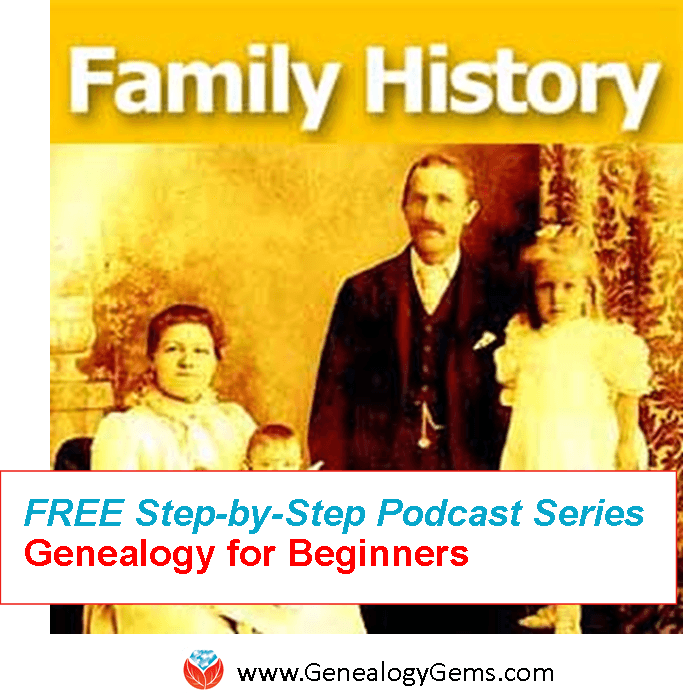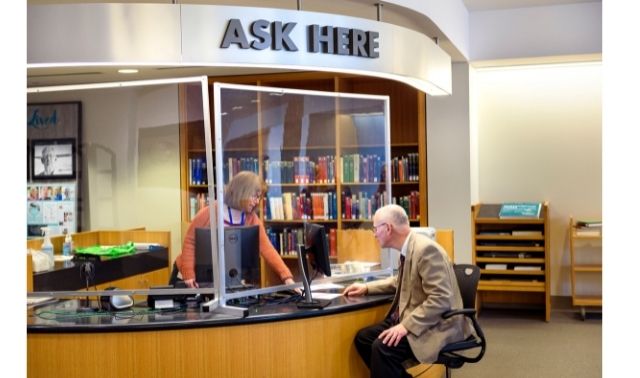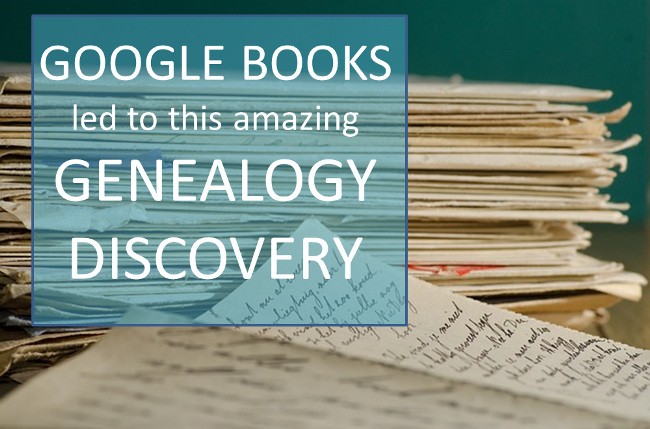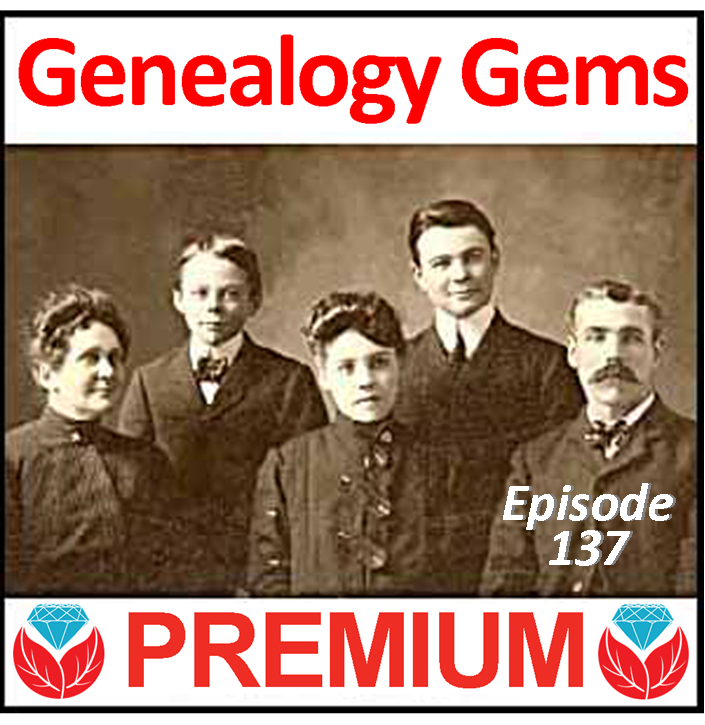Family History Episode 37 – Your Genealogy Questions Answered, Part 2
Family History: Genealogy Made Easy Podcast
with Lisa Louise Cooke
Republished June 24, 2014

Listen to the Family History: Genealogy Made Easy podcast by Lisa Louise Cooke. It’s a great series for learning the research ropes and well as refreshing your skills.
https://lisalouisecooke.com/familyhistorypodcast/audio/fh37.mp3
Download the Show Notes for this Episode
Welcome to this step-by-step series for beginning genealogists—and more experienced ones who want to brush up or learn something new. I first ran this series in 2008-09. So many people have asked about it, I’m bringing it back in weekly segments.
Episode 37: Your Genealogy Questions Answered, Part 2
Today’s show is all about YOU! Just like Episode 36, this episode is made up completely of your emailed questions, comments and stories. Joining me on today’s episode to read your emails again is my daughter, Lacey Cooke.
Question: Is there a way to get iTunes to download all of the podcasts instead of just the most recent ones? I thought I saw it on the website somewhere but now I can’t find it. –Melanie Armstrong
Answer: (updated since the podcast originally aired): In your iTunes LIBRARY, on the line where the Genealogy Gems Podcast is listed click the GET ALL button. This will download all the past episodes to iTunes on your computer, to be listened to at your convenience. Downloading will take several minutes. You will see a little spinning orange circle to the left of the podcast name as it downloads. Once the episode is downloaded the text will turn from gray to black. Double click the episode and it will start to play after a moment or two.
Question: I use the free forms at Family Tree Magazine’s website. Do you keep your old Family Group Sheets on file so you can double check them later? – R. Butler
Answer: I love all those free forms at Family Tree Magazine! I’ll tell you the truth, I decided to throw mine away. I transcribed everything into my database and threw away the paper. Everything is properly sourced there, which is key. I avoid duplicating efforts, which has happened to me when looking back at old paper forms. If I need to double-check things, I do it from the actual sources—the birth or death certificate or interview—not from the family group sheet. The only exception is if the group sheet is part of a brick wall case file that I haven’t solved yet. I keep them until the case is solved, and then the cited answers go into the database.
Question: How do you know when records/indices are complete? I have been looking for immigration records for my family and cannot find them.
They came in large family groups, so you would think it would be easy to find. Even though the name (Mauge) is often misspelled (Mange, Mauga) I cannot find them at Ellis Island, Steve Morse’s website, The National Archives or through my Ancestry.com subscription. The years span 1880 through 1885. Are these immigration records complete or am I looking in the wrong place? -Anne-Marie Eischen
Answer: There are many factors involved here, and many avenues to pursue. Based on other information you told me about your family’s arrival, here are some ideas:
- The Family History Library has microfilm of the Baltimore Passenger lists between 1920 and 1897 – and it lists the main author as the U.S. Dept of the Treasury, Bureau of Customs. Passengers are indexed by soundex and the soundex code for Mauge would be M200. But considering the variations you have found of the name you’ll want to arm yourself with the soundex codes for all those variations. The M200 names are on Film # 417302 which I found in the Family History Library catalog and familysearch.org and you can just go to your closes Family History Center and order the film for under $10 and they will send it to you to view at the center.
- Check the at the Immigrant’s Ships Transcribers Guild website.
- Click here for a great summary of Baltimore passenger lists by Joe Beine online.
- You will also find an index for Baltimore passenger lists between 1820 and 1897 at the Allen County Public Library in Fort Wayne, IN.
- Look closely at your source for the port information, and see if you can locate any other verification of that. Maybe she actually arrived through another port.
- Usually I would tell you to check departure lists, but in this case, departure lists for Bremen for that time period are not available.
- Here’s a great book recommendation for you: Finding Your Chicago Ancestors by Grace DeMelle.
Question: I wanted to share the results of my Google Alerts. My father had red hair and was called “Red” most of his life. So when I ask for “Red” Browning in my alerts, I have received information on the red Browning sweater (the Browning clothing line), a red Browning rifle case (they make guns) and recently the Cincinnati Reds Tom Browning went to jail (the Red’s Browning…). Alas, nothing yet on my Dad! Another family name is Gorry – you can imagine what I got last Halloween! I do love the alerts though – and have added eBay alerts too, thanks to you. Keep encouraging us and thanks for the great tips! -Joan Ketterman
Answer: I’m not sure how much I can help with that one – keep playing with the “plus” and “minus” signs in your searches to refine what you’re looking for. And I’m glad you’re using those eBay alerts. Learn more about eBay alerts in Genealogy Gems Podcast Episode 140. Note: Genealogy Gems Premium Members can learn more about Google Alerts in Premium Podcast Episode 28.
Comment: On the podcast you recommended using Google Books. I have a “gem” for you….I have a link where the LDS church has archived loads of family history books: http://www.familyhistoryarchive.byu.edu. Follow the link and type in the surname of your choice. I have found some wonderful stories there about my ancestors. – Susan in West Palm Beach Florida
Note: The BYU Family History Archive she references has migrated into the Family History (Digital) Books collection at FamilySearch along with the digital book collections of other repositories/ They are now searchable at FamilySearch.org.
Question: This is just something that bugs me. WHICH is the correct pronunciation of Genealogy??? GEEN-e-alogy (with a long “e” at the beginning) or Gen-e-ology (with a short “e” at the beginning)?
Answer: I’ve heard it both ways and I’ve pronounced it both ways. But when I went to Dictionary.com, they actually have an audio pronunciation and they say, GEEN-e-alogy, with a long “e” at the beginning. However you pronounce it, it’s a barrel of fun!
Question: How can I learn more about the Freedom of Information Act?
Answer: Listen to Genealogy Gems Podcast Episode 20 and Episode 21. It’s also covered in my book Genealogy Gems Ultimate Research Strategies.
Question: Hello, I just finished listening to the June Family Tree Magazine Podcast. I have been wanting to write to you for months now to ask you this question: Who is the musician playing the guitar music during the podcast? My husband is a big Chet Atkins fan and I thought it could be Chet but my husband says no just from listening to it. Can you please provide me with the musicians name? -Melissa Roberge
Listen to this episode to find out the answer!
Restarting Your Genealogy Research – Audio Podcast Episode 275
Has it been a while since you worked on your genealogy research? As passionate as we may be about genealogy, the reality is that a little thing called “Life” can get in the way! Getting back into genealogy can actually be a bit daunting. Where did you leave off? Where should you start back up?
If it’s been months or even years since you had your hands in genealogy, you’re in the right place. In this episode, we’re going to talk about how to pick up your genealogy after a hands-off spell so that you can quickly and efficiently get back on the trail of your ancestors.
This episode will also help if you feel like you’ve gotten a little out of control and disorganized in what you’ve been doing so far. This process also works very nicely as a quick audit to help you get back on track.
Listen to the Podcast Episode
To Listen click the media player below (AUDIO ONLY):
Show Notes & Video Version of this Episode
Show notes article and watch the video version: How to Get Back into Genealogy – Restart Your Genealogy!
Downloadable the ad-free Show Notes handout. Plus the BONUS download: Genealogy Restart Checklist (Both require Premium Membership.)
Become a Genealogy Gems Premium Member
Premium Members have exclusive access to:
- Exclusive video classes with downloadable handouts
- The Genealogy Gems Premium Podcast with downloadable handout
- Live Elevenses with Lisa shows
Learn more about Genealogy Gems Premium Membership.
Our Sponsors:
MyHeritage
Get your MyHeritage DNA Test Kit
Newspapers.com
Get 20% off a Publisher Extra subscription. Click here and use coupon code genealogygems
Visit Fort Wayne
Fort Wayne, Indiana is the home of the second-largest free genealogy library in the country. Make your plans to visit today. Learn more at https://www.visitfortwayne.com

Learn more about the free genealogy resources at VisitFortWayne.com
Genealogy Gems Podcast App
Free Genealogy Gems Newsletter
Follow Lisa and Genealogy Gems on Social Media:
- Instagram.com/genealogygemspodcast
- Facebook.com/genealogygems
- Pinterest.com/lisalouisecooke
- YouTube.com/GenealogyGems
Podcast Resources
Click the Download icon in the player below to download the mp3:
New England genealogy records top US updates
Find New England genealogy records for Vermont pioneers, Boston Catholics and Berkshire, MA residents among new and updated collections online. Also: vital records updates for Idaho, Nebraska, New York state and Tennessee.Featured: New England genealogy recordsVermont...Google Books for Genealogy Success Story
Using Google Books for genealogy is a successful tool to many. A Gem’s reader shares the remarkable story she uncovered using the tips for using Google Books she learned from a recent Genealogy Gems Premium podcast.

From Genealogy Gems Premium member:
“Hi Lisa,
 I was just listening to the newest Premium podcast concerning filtering the lists on Google Books (Premium episode 137). I would like to relay my story for using your hints and tips on Google.
I was just listening to the newest Premium podcast concerning filtering the lists on Google Books (Premium episode 137). I would like to relay my story for using your hints and tips on Google.
My great-grandfather was a Confederate soldier. At the age of 48, he married my great-grandmother and my grandmother was born the next year. I found much to my dismay, that he committed suicide when my grandmother was a few weeks old. It was stated that he had what would be described today as post-traumatic stress disorder, and the burning of the court house where he worked as a county clerk set off something. My Dad was born on what would have been my great-grandfather’s 90th birthday.
I have known for about 30 years that my great-grandfather wrote articles under a pen name. My aunt told me she had been told he wrote articles about the scenery in southern Utah where he lived. I searched and searched and never found any of his articles. Then, I had a breakthrough. I found the pen name by using several tips you mentioned for using Google. The pen name was Lock Melone. It was spelled differently than I had been told.
It turns out, he was a very well-known humorist. One of his stories appears in a publication alongside an article by Mark Twain. (He wrote articles in the 1870s and 1880s.)
Now, back to your tips on Google. I was Googling, checking all the old newspapers I could find to collect his writings. One of the sources continually mentioned in Google Books was a literary magazine called The Californian. These were not all free on Google, but I was not to be deterred after all these years! I used the basic information and time frames listed in Google Books and looked at WorldCat. That led me to e-books and to some of the holdings in universities around the country.
As of today, I have found 69 of his articles! They have made an ancestor who I thought had a rough life with a tragic end, a new person, full of life and laughter! I am sure his stories are based on events that occurred during his “real life” adventures. He lived life to the fullest, traveling a great deal, and saw the world through a light heart.
I am continuing to search for more articles and have begun to compile his writings to give to my children and cousins for a Christmas present this year (if I can figure out how to put it all together!) With my grandmother as his only child, I will have given his life to all his descendants, a very special chore on which I have worked on with great pleasure.
Thanks for the tips on Google and other sites you have given over the years.”
This Gems member is certainly on the right track in many ways. She figured out how to harness the power of Google to search for the proverbial needle in a haystack—not just her grandfather’s articles but articles written under a pseudonym! Good for her for using Google Books and WorldCat. That’s a great combination. You can learn more about using WorldCat for genealogy in my book How to Find Your Family History in Newspapers and in the Premium video Getting the Scoop Part 2: Tech Tools for Newspapers.
Follow-up Ideas for Using Google Books for Genealogy
Here are a few follow-up suggestions re lating to finding issues of a literary magazine or another scholarly publication like The Californian:
lating to finding issues of a literary magazine or another scholarly publication like The Californian:
First, turn to another powerful free tool in the Google toolbox: Google Scholar. It takes Google Books to the next level and you may hit on some things that Google Books may miss. Refer back to Premium Podcast 136 for a discussion of Google Scholar for genealogy, and Chapter 11 in my book The Genealogist’s Google Toolbox, Second Edition.
Second, remember that sometimes serial publications change names, or two different ones may have the same name. Wikipedia’s not the most expert source, but its article on The Californian says something you can follow up on. The Californian was published from 1880 to 1882, as a continuation of the earlier Overland Monthly which had stopped in 1875, and then in 1882 it switched back to its old name. This means you should look for both titles.
A third idea may be to check e-bay for back issues of old magazines and journals. Sometimes, it’s cheaper and easier to buy them than to try to borrow them through inter-library loan. E-bay does happen to have a CD version for sale of The Californian issues from 1880 to 1882. I talk more about finding family history items on e-bay in the Premium Podcast episodes 16, 76, and 131.
Lastly, don’t forget JSTOR. JSTOR is a shared digital library for scholarly journals and the like. It launched in 1995 to serve university and college libraries, running out of space to store old journal issues. Today, it includes over 2,300 journals and thousands of other materials. It’s even started including books. Over 50 million pages are digitized, with another 3 million being added every year.
The nice thing about JSTOR is that you don’t have to be affiliated with a major library to get access now. Individuals can register for free access allowing them to read some materials online. They offer free access to their Early Journal Content collection of scholarly content published before 1923 in the U.S. (and before 1870 in other parts of the world.) That collection alone has nearly a half million articles from over 200 journals.
Unfortunately in this case, JSTOR doesn’t have The Californian or Overland Monthly in its collections. But one can certainly use JSTOR to search for other journals. JSTOR is just a great resource for anyone to use when searching for historical articles, especially those you may come across in Google Scholar without the full article text.
Your Google Books for Genealogy Success Stories
It is so rewarding to hear your success stories in using Google Books for genealogy. Your stories inspire others. Please feel free to share your experiences in the comment section below.
Keep Reading: More Gems on Using Google Books for Genealogy Success
Free Video: Google Books Image Search for Genealogy and Family History


